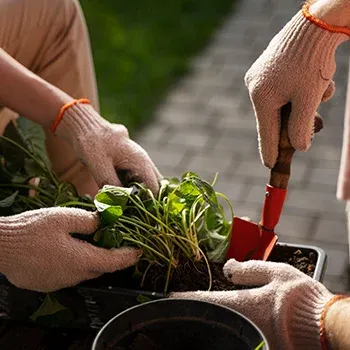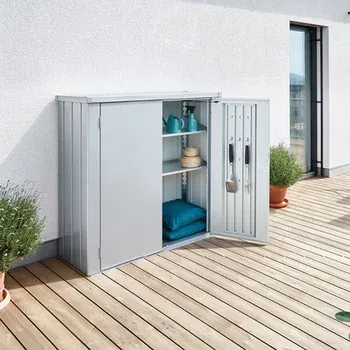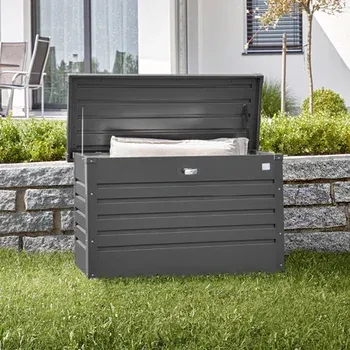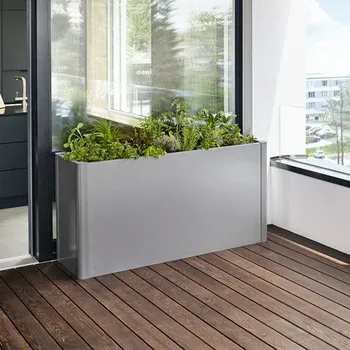Urban Gardening

Urban gardening in the smallest of spaces, yet efficient and at least as much fun: that's urban gardening. Whether on public spaces, in a community garden or on a private balcony, in this article we reveal a few great tips and tricks about urban gardening and what you should definitely bear in mind.
- What is urban gardening
- What do I need for urban gardening
- Urban gardening on my own balcony
- Urban gardening in a community garden
- Planting fruit and vegetables in the smallest of spaces
a. Tips for growing fruit and vegetables for urban gardening - Plant pots and storage space options for urban gardening
- Tips for environmentally friendly urban gardening
What is urban gardening?
Urban gardening refers to all gardening activities in urban areas, whether in a communal garden, on your own balcony or on your own terrace. In many large cities around the world, rooftops are also used for this purpose. For people who live in cities and do not have their own green space, urban gardening is the perfect way to grow their own plants, fruit and vegetables. Urban gardening therefore not only offers a great opportunity to grow healthy and fresh fruit and vegetables in an urban or rather atypical environment, but can also help to make cities greener and more liveable.
Cities and municipalities also often organise their own urban gardening projects, in which unused green spaces in urban areas are revitalised by interested hobby gardeners and cultivated in an environmentally friendly way.
Urban gardening has been very much in vogue in Austria for several years now and more and more people are getting involved in self-organised or city-initiated urban gardening projects. It is important to ensure that local regulations are adhered to.
What do I need for urban gardening?
In order to practise urban gardening, you need a small area where you can plant something, clever plant containers that don't take up too much space and a few small gardening tools to cultivate the beds. The great art is to garden in the smallest of spaces. Stable and space-saving planting beds and storage options are the be-all and end-all.

Urban gardening on your own balcony
Transforming your own balcony into a little paradise. This can be worth its weight in gold - especially in the city! With creative ideas and the right equipment, even the smallest balcony can be transformed into a really cosy oasis. To begin with, it's best to measure the available space and plan it properly. To do this, first ask yourself what you want to store and what you need. As with so many things in life, the same applies here: Planning is half the battle!
Space-saving containers are a must-have for urban gardeners. There are numerous options here, in all kinds of shapes and colours. Planters made of high-quality metal, narrow planting beds and small raised beds are perfect solutions for gardening in the smallest of spaces.
Urban gardening in a community garden
Urban gardening projects are not only a great way to create additional green spaces in the city, but community gardens are also a great way to network with other gardeners and exchange knowledge and experiences. In community gardens, gardeners can work together, gain a lot of new knowledge about gardening, look after a garden together and build a social network at the same time.
Here is a small checklist for anyone who would like to get involved in a community garden:
- Find a community garden in your neighbourhood: The best way to do this is to simply research online. If there is not yet a community garden in your immediate vicinity, this may be the ideal opportunity to get active yourself and set up an initiative.
- Find out about the rules in existing community gardens
- Become a member
- Work together and share ideas
- Share your harvest and successes with the other community gardeners
- Learn from the other gardeners
- Organise joint events
- Be open to change: Change can happen in a community garden, whether it's new gardeners or new ideas. Therefore, one should be open to change and thereby promote the development of the community garden.
Urban gardening in the context of community gardens is therefore not only an excellent way to live in a more environmentally conscious way, but also a way to strengthen the community and promote awareness of sustainable living.
Planting fruit and vegetables in the smallest of spaces
There are many types of fruit and vegetables that are well suited to growing in the smallest of spaces and are therefore ideal for growing on balconies or patios.
- Tomatoes:
Tomatoes are easy to grow and take up very little space. They can be grown in pots or raised beds on the balcony. Important to note: tomatoes need plenty of sunlight.
- Peppers and chillies:
Peppers and chillies require similar conditions to tomatoes and can also be grown in pots or a raised bed on the balcony.
- Herbs:
Herbs such as basil, parsley, chives or thyme can be grown in pots on the patio or balcony or on a windowsill in very little space. These popular herbs can of course also be planted in a raised bed.
- Lettuce:
Lettuces can be grown in planters or in a raised bed on the balcony and don't need much space either. There are many different types of lettuce that are suitable for growing in urban gardening, for example cut lettuce.
- Radishes:
Radishes are fast-growing plants and are well suited for growing in pots as well as in small raised beds.
- Peas:
Peas can be grown in pots or in a small raised bed. They need some space to climb, but there are also varieties that grow low.
- Berries:
There are many different berries that are well suited to growing in urban gardening, such as strawberries, raspberries and red currants. They can be grown in pots or in a small raised bed.
- Cucumbers:
Cucumbers can be grown in pots or in a small raised bed. They require plenty of sunlight and need to be watered regularly.
There are many other types of fruit and vegetables that are suitable for growing in urban gardening. It is important to find out about the needs of the respective plants and to care for and water them accordingly.
Tips for growing your own fruits and vegetables in urban gardening
- Raised beds: If space allows, you should definitely opt for raised beds, as almost anything can be grown in them. It's also easy on your back when gardening.
- Choose suitable varieties for the respective location: On balconies and terraces, for example, lettuce, strawberries and beans are easy to grow. Larger plants such as tomatoes, peppers and cucumbers are also possible, but it is important to remember that they require more space. Ideally, they should be planted in a raised bed or at least in a large pot that can ideally hold around 15 litres of soil.
- Focus on diversity: When growing in urban gardening, for example, you can also use rare or old varieties that are often not commercially available. In any case, when planting different varieties together, always make sure that they are compatible and can be planted next to each other.
Planters and storage space options for urban gardening
The right choice of planters and clever storage space solutions are particularly important in the smallest of spaces so that you can really utilise the full potential.
Raised and planting beds made of metal are particularly popular on terraces and balconies for adding greenery to your own little kingdom and harvesting a fine selection of herbs and vegetables. They can also be perfectly designed as privacy screens or natural room dividers. Thanks to the large selection of models, there is guaranteed to be a suitable and attractive solution for every spatial situation.
A Patio locker is ideal for storing the necessary gardening utensils and keeps everything within easy reach. With its shallow depth, the popular Biohort patio locker Romeo in size Medium (dimensions: 132x57x140 cm) creates plenty of storage space without taking up too much room. Ideal for small patios and balconies.
The Biohort leisure box is perfect for anyone who has a little more space and needs more storage space. Thanks to its larger capacity, it can be used to store many practical gardening tools, equipment and seat cushions in a rainproof environment. Our cushion box is available in different designs and sizes. The smallest version of the Biohort leisure box measures 101x46x61 cm.
Practical planting beds are a must for all urban gardening fans who want to let off steam on their balcony or patio. The Biohort Belvedere planting bed in Mini and Midi sizes is perfect for this. Depending on the space available, the DaVinci planting bed system can be customised to make the most of even the smallest space for gardening.
The Biohort product range includes a number of products that are ideal for urban gardening.
Tips for environmentally friendly urban gardening
There are a few tips that you can take into account for environmentally friendly urban gardening. For example, you can collect rainwater and use it to water your plants. Composting kitchen waste can also help to improve the soil and reduce waste. You can also use natural pesticides and categorically reject the use of chemical pesticides. Another option is to consciously grow insect and bee-friendly plants.
Urban gardening is a great way to connect with nature and beautify your surroundings. By planting vegetables and herbs, you can not only harvest fresh and healthy food, but also create your own green oasis in the city. Just get started and be motivated by the successes you will achieve. Every little step counts and you will be proud when you see your own plants growing!


